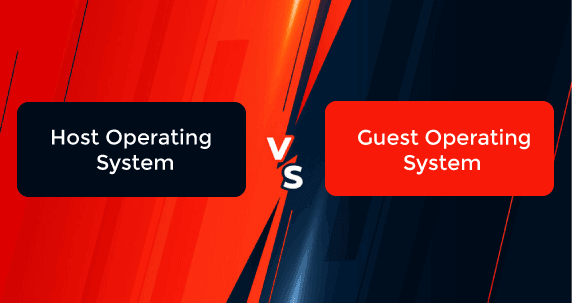Difference between Host and Guest Operating System
In this article, you will learn about the difference between the host and guest operating systems. But before discussing the differences, you must know about the host and guest OS.

What is the host operating system?
A host OS is a software that is installed on a computer and allows it to interface with the hardware. It is capable of running a type 2 hypervisor. In other terms, type 2 hypervisors execute on the host OS.
Host OS may also use container-based virtualization. A container aids in the logical partition of server programs. As a result, containers can be used without providing a complete operating system for each application. It allows apps to share the kernel of the operating system while using different hardware resources. A shared operating system of this type is also known as a host operating system.
Due to the virtualization, a single physical server may be divided into several virtual machines, which are independent parts of hardware with lots of processing, storage, network capability, and memory. Virtualization is more efficient and less expensive when it comes to sharing resources among the host and guest operating systems.
What is Guest Operating System?
Type 2 hypervisors may create multiple Virtual Machines. Each machine has its operating system, and these are known as guest OS. In other terms, a guest OS is a software that is installed within a virtual system. As a result, the virtual machine runs the guest operating system The guest operating system differs from the host operating system in several ways, and it may function as a portioned system component or a virtual machine part in virtualization. It is mainly used for apps on another operating system.
While the guest OS and host OS share resources, their activities are fully independent of one another. It is feasible that these several operating systems will run simultaneously, but the host operating system should be started first. One of the key advantages of using a guest OS is running applications and programs that are incompatible with the host OS.
Main Differences between the Host Operating System and Guest Operating System
Here, you will learn the main differences between the Host OS and the Guest OS. Various main differences among the host OS and the guest OS are as follows:
- A host OS is a software that is installed on a computer system and communicates with the underlying hardware. In contrast, a guest OS is a software that is installed in a virtual machine.
- The host OS executes directly on the hardware. In contrast, the guest OS executes on a virtual machine.
- The host OS may be single. In contrast, the guest OS may be single or multiple.
Head-to-head comparison between the Host Operating System and Guest Operating System
Here, you will learn the head-to-head comparison between the host OS and the guest OS. Various head-to-head comparisons between the host OS and the guest OS are as follows:
| Features | Host Operating System | Guest Operating System |
|---|---|---|
| Definition | A host OS is a software that is installed on a computer system and communicates with the underlying hardware. | A guest OS is a software that is installed in a virtual machine. |
| Function | Interaction of the host OS takes place with the hardware. | Interaction of guest OS takes place with the virtual machine. |
| Quantity | Host OS may be single. | The guest OS may be multiple or single. |
| Execution | It runs directly on the hardware. | It runs on a virtual machine. |
Conclusion
In basic terms, the original operating system is the host OS that provides an environment in which the guest OS may run. The main difference between a host OS and a guest OS is that the host OS operates directly on the hardware. In contrast, the guest operating system runs on a virtual machine.
